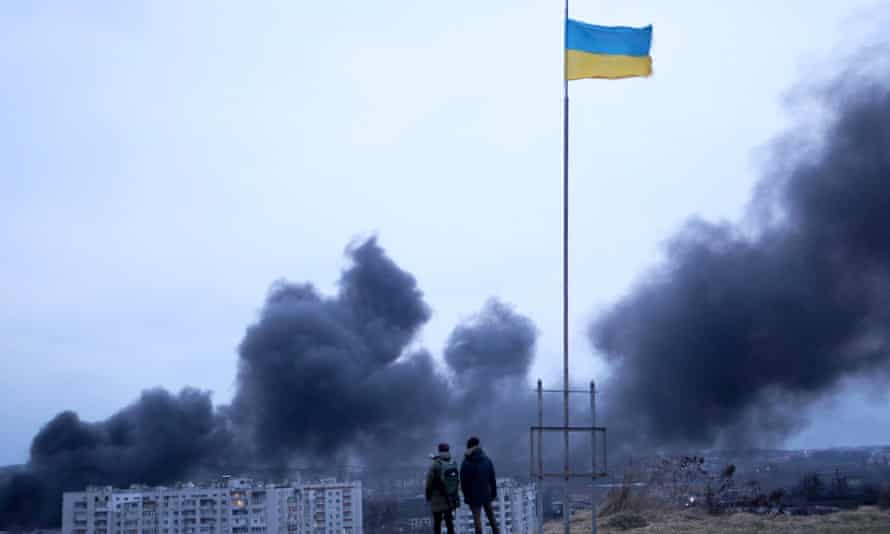Horrific scenes of mass murder on the outskirts of Kyiv should appall everybody and surprise nobody.
The brutalization of civilians has been the Putin regime’s calling card since its inception — from the Moscow apartment bombings of 1999, where the weight of circumstantial evidence points the finger at Vladimir Putin and his security service henchmen, to the murders of Anna Politkovskaya, Alexander Litvinenko, Sergei Magnitsky and Boris Nemtsov to Russia’s atrocities in Grozny, eastern Ukraine, Aleppo and now Bucha.
Mostly, the world has found it easier to make excuses to get along with Putin than to work against him. One example: . . . Berlin is now a major diplomatic obstacle to imposing stiffer sanctions on Russia, and Germany continues to buy Russian gas, oil and coal, to the tune of $2 billion a month.
To put this in simplified but accurate terms, Germany — having fiercely resisted years of international pressure to lessen its dependence on Russian gas — finds itself in the position of funding the Russian state. That is money that helps keep the ruble afloat and the Kremlin’s war machine going. Surely this can’t be the role that Berlin wishes to play.
But this requires a clear articulation of Western aims in this crisis. Do we want peace now — or at least as soon as possible? Do we want Ukraine to achieve an unmistakable victory over Russia? And do we want Putin to go?
The advantage of peace now — a cease-fire followed by a negotiated settlement — is that it would end both the immediate fighting and the risk of a wider war. These are not small things, and the temptation to seize them will be great, especially if Putin hints at an escalation that terrifies the West. An added temptation is to suppose that Russia has already suffered a “strategic defeat,” . . . while giving Putin the “offramp” he supposedly needs.
Problems with this course of action? It would consolidate most of Russia’s territorial gains in the war. It would allow Russian forces to continue terrorizing their captive Ukrainian subjects. It would give Putin the chance to present himself as a victor to his domestic audience. And it would provide him with the option to restart the conflict at a future date — an exact replay of what happened after Russia’s first Ukraine invasion, in 2014.
The second option is to help Ukraine seek a decisive military victory. That would mean more than simply beating back Russian troops in the vicinity of Kyiv. It would also mean clearing them out of every other area they’ve seized since February, if not of what Russia seized in 2014.
This would require months of bloody fighting, a small but real risk of wider war and the long-term economic consequences of trying to wean the West from Russian energy. It would also require the West to supply Ukraine with the kinds of weaponry it needs to win: anti-ship missiles, high-altitude antiaircraft missiles, mine-resistant armored personnel carriers and so on.
Critics will argue that this option would put Ukraine’s long-term interests ahead of the West’s immediate ones. But the West also has a profound interest in seeing Russia lose decisively. It would salvage the principle that sovereign borders cannot be changed by force. It would deter similar forms of adventurism, above all a Chinese attempt to take Taiwan. It would send the illiberal nationalists quietly or not so quietly rooting for Putin, from Tucker Carlson at Fox News to Marine Le Pen in France, back to their fever swamps.
It could also seriously undermine Putin’s political grip. To argue that the West has no compelling interest in wanting to see him fall is to pretend that this time, he’ll slink back into his corner and leave the world alone.
But there is a range of options the West hasn’t yet touched when it comes to Putin. We could turn Russia’s frozen foreign reserves and other assets into an escrow account for Ukrainian reconstruction, rearmament and refugee resettlement. We could counter the Kremlin’s dezinformatsiya campaigns in the West with informational campaigns for Russian citizens, particularly when it comes to highlighting their leaders’ ill-gotten wealth. We could set an ambitious date for placing sanctions on all Russian energy imports. Brussels could invite Kyiv into a formal accession process into the European Union as a sign of moral solidarity.
None of these may be a silver bullet when it comes to toppling Putin’s regime. But regimes that face military defeat, economic impoverishment and global pariahdom — as the Soviet Union did by the mid-1980s and Argentina did after its failure in the Falklands — are the ones likeliest to fall. The task for the Biden administration is to persuade our allies to pursue all three while the horrors of Bucha remain fresh in our minds.

No comments:
Post a Comment